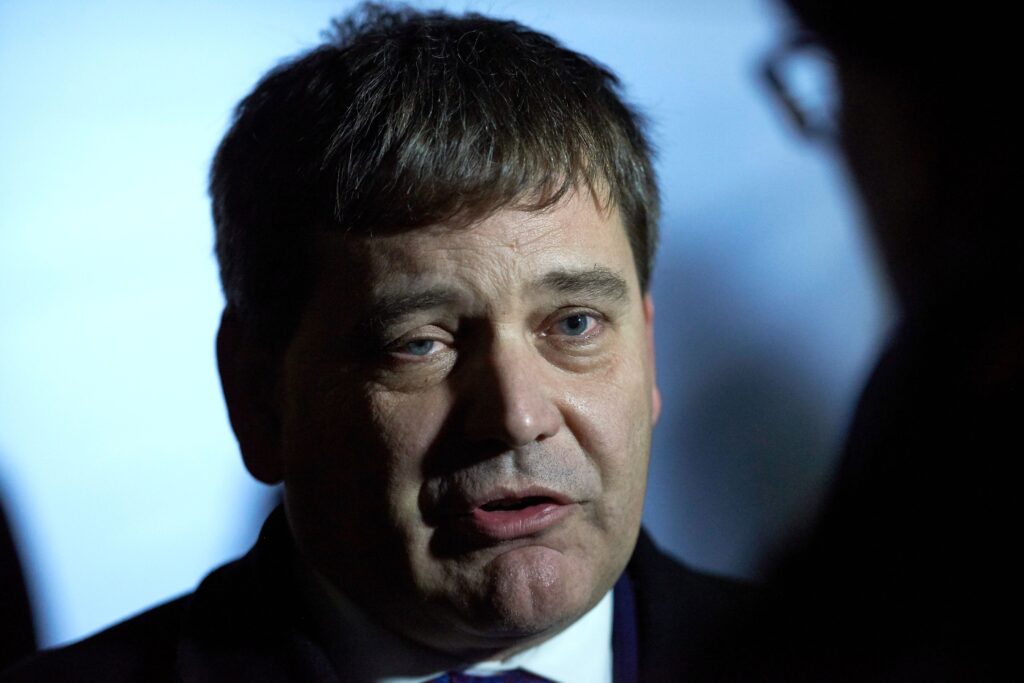How conspiracy theories infected British politics
Press play to listen to this article
Voiced by artificial intelligence.
LONDON — Welcome to Britain, where an elected member of parliament openly rages against “crime against humanity” COVID vaccines and a £12.50-a-day pollution charge is a “trojan horse” for government “control.”
Conspiracy theories are not a new force in British politics. But there’s mounting concern that, on a host of issues, once-fringe ideas are increasingly being ushered into the mainstream — with a little help from politicians.
Such worries stepped up a notch earlier this year when Andrew Bridgen, a Conservative MP since 2010, lost the party whip after comparing the COVID-19 vaccine rollout to the Holocaust.
Since being ousted from the Tories, Bridgen sits as the sole parliamentary member of TV actor Lawrence Fox’s avowedly “anti-woke” Reclaim Party. Although Fox and his other MP hopefuls have failed at every race they’ve run in, adopting Bridgen into the fold means Reclaim has achieved parliamentary representation without having to win an election.
You may like
Rod Dacombe, a reader in politics and a conspiracy theory specialist at King’s College London, says the MP’s position gives establishment heft to potentially dangerous groups.
“For this small but very active movement, he’s their MP now,” Dacombe says. “He’s quoted conspiracy circles and literature really frequently. He’s hosted people who are concerned with vaccine harms in Parliament, so I think it does add a degree of legitimacy to boost that movement.”
Andrew Bridgen did not respond to POLITICO’s multiple requests for comment.
Not just vaccines
Bridgen’s views on COVID vaccinations have seen him turfed out of the Conservative party. But it’s not the only issue on which conspiracy-tinged language is creeping into politics, often with less scrutiny.
Local politics has been gripped, for example, by the concept of a “15-minute city,” a relatively benign planning concept that stresses the need for easy-to-reach amenities. It’s been pilloried online as a “dystopian plan” to lock people within the confines of a neighborhood and shut them out of the rest of the world.
Similar language has even crept into the Commons. Conservative Nick Fletcher told fellow MPs earlier this month that “15-minute cities will cost us our personal freedom” — and described them as an “international socialist concept.”
Asked if he is aware that sentiments are being pushed by conspiracy theorists, Fletcher told POLITICO in a statement: “Nobody stood for election on a clear manifesto to control and tax the way people travel and restrict their liberties. I believe that this country is the best in the world due to its tolerance for others. ULEZ, CAZ and so-called 15 minute cities are fundamentally non-British and should be scrapped.”
Dacombe warns, however, that heightened language around 15-minute cities shows “conspiratorial ideas affect[ing] the mainstream of political discourse,” adding that “there’s a small group of people in the U.K. for whom these ideas are the primary way in which they approach politics.”

Opposition to 15-minute cities has recently melded with attacks on London’s ultra-low emission zone (ULEZ), which has become a new lightning rod for conspiracies that go well beyond standard policy critiques.
ULEZ was controversially expanded to more of London by the city’s mayor Sadiq Khan over the summer. It has its fair share of critics, with both Labour and the Tories blaming the charge on high-polluting vehicles as a key reason the anti-ULEZ Conservatives pulled off a surprise by-election win.
But the campaign against it has at times tipped into full-blown conspiracy theorizing, and the notion that ULEZ is a way for the government to control the public has become commonplace in online discourse.
On the day ULEZ expanded into greater London, protesters — most affiliated with the “Action Against ULEZ Extension” group — gathered outside 10 Downing Street to make their views known. The group describes its main objective as being “to stop the ULEZ extension before it’s even started and to ensure that pay per mile, 15-minute cities and living under a dictatorship controlled regime never happens.” The group says it doesn’t want to be forced “into living in open prisons.”
The Metropolitan Police recently announced that 510 cameras had been damaged in the five months leading-up to the ULEZ launch.
Dacombe warns about the fine line between heightened campaign rhetoric and conspiracy talk. “It’s a really good example of the translation of the ideas which we’ve seen kind of bandied around the [conspiracy] movements into formal politics.”
Online rage, offline consequences
For those on the receiving end of conspiracy theories, the consequences can be all too real.
In 2020, the Equality and Human Rights Commission published a damning report on antisemitism in the U.K. Labour Party, which found some members had peddled conspiracies framing Jewish people as controlling the opposition, describing them as a “fifth column.”
It found members had shared tropes about the Rothschild family and open Holocaust denial. The EHRC — which has since stopped monitoring Labour and said the party has taken action to address the problem — found that many incidents of antisemitic misinformation had gone uninvestigated. But not before some members, and even MPs, quit the party in disgust.
Lately, lawmakers have found themselves on the receiving end of online abuse for distorted takes on their votes in the House of Commons. Bridgen recently took to the floor of the House of Commons to introduce a 10-minute rule bill, a symbolic motion that can be used to highlight campaign issues.
The Reclaim MP argued for new legislation to “protect” children in schools “[forbidding] the promotion of gender identity,” and said — without evidence — that schools are seeing “nine-year-old children being taught about masturbation or witnessing dolls simulate sex acts.”
Bridgen’s 10-minute rule — though controversial — got 33 votes of support, with 39 MPs voting against. That’s when the attacks on those opposed began.
Some of the MPs who voted against the motion were mentioned in incendiary tweets from Reclaim leader Lawrence Fox — who boasts 401,000 followers on X, formerly Twitter.
Fox and Bridgen used posts to describe those who had voted against the motion as opposing “the protection of children from grooming and social transitioning in school without parental knowledge or consent.”
Responding to those tweets, X users then baselessly accused these MPs of being pedophiles.
One Conservative MP who was framed in this way, and who was granted anonymity due to the sensitivity of the issue, described the feedback they had received as “vile.”
They said the online response had made them question their vote, not because they didn’t believe in it, but because they weren’t sure the abuse was worth it.
“From my perspective, I think it was right to vote against Bridgen, but you’re caught in this Catch 22 of responding to live public opinion on Twitter versus trying to think about what we want to do as a government to shape the country,” they said.

Neither Bridgen or Fox responded to POLITICO’s request for comment on this point.
Anti-democratic
Dacombe warns that online abuse can rapidly escalate, warning that there “is a really clearly defined pathway from this kind of conspiracy to terrorism or violent acts.”
“It is inherently anti-democratic, in the sense that if you believe this stuff, you don’t believe in mainstream political institutions,” he warns.
“So, in a way, Andrew Bridgen and aligned MPs, tend to essentially work against institutions they represent, because if you believe in conspiracy theories, you don’t believe that parliament’s working for you, you don’t believe in mainstream forms of expertise, and so on.”
Labour MP Charlotte Nichols says the pandemic saw a huge uptick in the conspiracy-related abuse she received, and although it has lessened since, it’s not gone back to pre-pandemic levels.
“It got to the point where you’d be doing school visits and kids would have questions clearly planted by their parents about some of these concepts,” she says, adding: “You’d have children saying ‘What are you doing about the WEF?’” The WEF — World Economic Forum — is at the center of the ‘new world order’ conspiracy theory, which suggests leaders created the COVID-19 pandemic to seize control over citizens’ lives.
In recent days, Nichols has shared a video online which shows her being accosted in her constituency by a man calling her a “fascist” and telling her that Jewish people “dominate” Westminster.
The editor of the fact checking site Full Fact, Steve Nowottny, says politicians could, as a first step, start to improve Britain’s discourse by correcting mistakes and showing their sources, “which all sounds very motherhood-and-apple pie, but it’s actually really important, and it doesn’t happen very often.”
FullFact often writes to MPs to highlight when they’ve made a false claim, but often this does not result in a correction.
Nowottny warns: “If you can’t trust what a politician says in parliament and can’t trust that, were they to make a mistake, [they would] then correct the record — that says something quite fundamental about our democracy that is quite concerning.”
This article has been archived for your research. The original version from POLITICO Europe can be found here.


